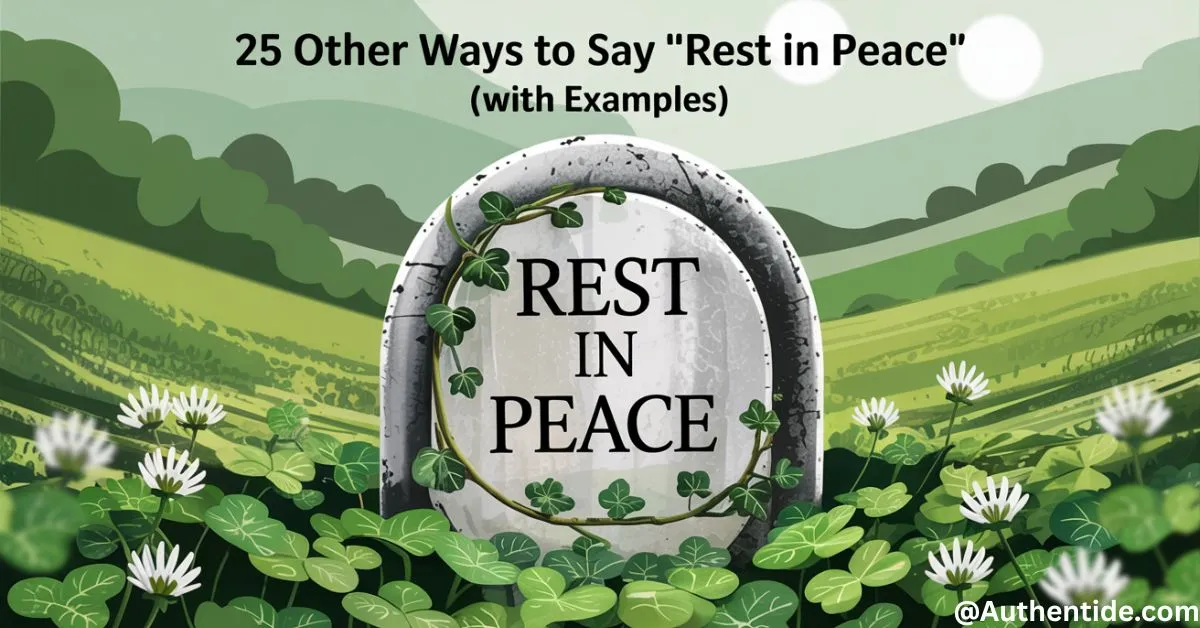Rest in peace touches our hearts with its gentle comfort, yet sometimes we yearn for words that capture the unique spirit of those we’ve lost. In those raw moments of grief, when standard phrases feel insufficient, finding alternative expressions can help us honor our loved ones in more personal ways. The journey through loss demands words that truly reflect the depth of our emotions and the exceptional souls who’ve departed this world.
The language we choose when saying goodbye carries profound weight. Whether penning a heartfelt sympathy card, crafting a memorial speech, or simply trying to comfort a grieving friend, finding the perfect words to express our emotions can feel overwhelming. This guide offers 25 beautiful alternatives to “rest in peace” that might better convey your sentiments during difficult times of loss.
Throughout life’s grieving process, we often struggle to find expressions that genuinely honor those who’ve left us too soon. These thoughtful alternatives to “rest in peace” can provide comfort to family members in their darkest hours, offering a glimpse of light when words seem inadequate. From traditional phrases to more contemporary expressions, these alternatives help us navigate the complex emotions of saying goodbye.
What to Say Instead of “Rest in Peace”
- May You Rest in Paradise
- Find Eternal Peace
- Rest Among Angels
- May Your Soul Be at Peace
- Rest Well in Paradise
- Sleep in Heavenly Peace
- Eternal Slumber
- May Light Perpetual Shine Upon You
- Rest in Power
- Until We Meet Again
- Return to the Stars
- Journey Well to the Beyond
- Rest in Eternal Peace
- May You Find Serenity Beyond
- Your Memory Lives On
- Gone From Sight, But Never From Heart
- May Your Spirit Soar Free
- Return to Your Ancestors
- Shanti (Peace in Sanskrit)
- Rest in Joy
- Become One With Nature
- Find Peace Among the Trees
- Return to Stardust
- “To Live in Hearts We Leave Behind Is Not to Die”
- May You Rest in the Arms of Eternity
is it Professional to Say: “Rest in Peace”
Saying “Rest in Peace” is generally considered professional in formal condolence settings. This time-honored phrase conveys respect and compassion without religious overtones, making it appropriate for diverse professional environments. For workplace communications, it strikes the right balance between sympathy and professionalism. However, relationship context matters in closer professional relationships, more personalized expressions might feel more authentic while maintaining appropriate boundaries.
Meaningful Alternatives to “Rest in Peace”
Here are 25 Meaningful Alternatives to “Rest in Peace” (With Example):
1. May You Rest in Paradise

When someone truly special leaves this world, sometimes we envision them in a place more beautiful than anything earthly. The phrase “rest in paradise” suggests they’ve found their way to an idyllic afterlife.
Example: In a sympathy card to Thomas after losing his mother: “Your mother’s kindness touched everyone she met. May she rest in paradise among beautiful gardens that match the beauty she brought to this world.”
2. Find Eternal Peace
This phrase acknowledges the struggles someone might have faced in life and wishes them unending tranquility in what comes after.
Example: In a eulogy for a veteran: “After years of carrying the invisible wounds of war, our beloved James has finally found eternal rest. May his spirit know the peace that sometimes eluded him in life.”
3. Rest Among Angels
For those who brought light into the world with their goodness, this phrase suggests they’re now among beings equally radiant.
Example: In an online memorial post: “Our sweet Olivia, whose laughter brightened even the darkest days, now rests among angels. Heaven gained a truly beautiful soul yesterday.”
4. May Your Soul Be at Peace
This expression focuses specifically on the person’s spiritual essence finding tranquility.
Example: In a sympathy email to a colleague: “I was deeply saddened to hear about your father’s passing, Sarah. May his soul be at peace as his legacy lives on through the family he so lovingly raised.”
5. Rest Well in Paradise
Combining rest and paradise creates an image of peaceful relaxation in a heavenly setting.
Example: Written in a funeral guest book: “Uncle David, you worked tirelessly to make everyone around you happy. Now it’s your turn to rest well in paradise while we carry forward the lessons you taught us.”
6. Sleep in Heavenly Peace

This gentle phrase likens death to sleeping, suggesting a peaceful transition rather than an ending.
Example: On a memorial candle card: “For our dear Emily, who fought so bravely. Sleep in heavenly peace, free from pain at last.”
7. Eternal Slumber
Similar to sleep but with an emphasis on the timelessness of what comes after life.
Example: In a condolence letter: “May your brother’s eternal slumber be filled with the same joy and tranquility he brought to everyone around him during his remarkable life.”
8. May Light Perpetual Shine Upon You
This traditional phrase, often used in religious services, wishes for divine light to continually bless the deceased.
Example: In a church memorial service: “As we say goodbye to our beloved choir director, Margaret, we pray that light perpetual shines upon her as brightly as her music illuminated our lives.”
9. Rest in Power
Particularly meaningful for those who fought against injustice or overcame significant obstacles, this phrase celebrates strength even in death.
Example: In a social media tribute: “To Professor Williams, who dedicated her life to education reform and equality—rest in power. Your fight continues through every student you inspired.”
10. Until We Meet Again
This phrase acknowledges separation while maintaining hope for reunion.
Example: In a letter to a family who lost their grandfather: “Mr. Rodriguez built a legacy of love that spans generations. Until we meet again, may he watch over your family with the same care he always showed.”
Comfort for Different Relationships
Here are Comfort for Different Relationships:
For Family Members
11. Return to the Stars
A poetic expression suggesting our loved ones become part of the cosmos.
Example: In a card to a niece who lost her mother: “Your mom always had that special sparkle in her eyes. Now she has returned to the stars, shining down on you every night.”
12. Journey Well to the Beyond

This phrase acknowledges death as a transition rather than an ending.
Example: At a grandmother’s funeral: “Grandma Elena taught us that life is a series of adventures. Now, as she journeys well to the beyond, we celebrate the incredible path she walked with us.”
13. Rest in Eternal Peace
A slight variation that emphasizes the everlasting nature of the peace wished for the departed.
Example: In a memorial program: “After 95 remarkable years of bringing joy to others, our patriarch Michael now rests in eternal peace, leaving behind a legacy of kindness that will never fade.”
For Friends and Colleagues
14. May You Find Serenity Beyond
This expression wishes for a peaceful afterlife without specifying any particular religious concept.
Example: In an email to coworkers about a departed team member: “Our office won’t be the same without Rachel’s infectious energy. May she find serenity beyond as we honor her memory by bringing the same passion to our work that she always did.”
15. Your Memory Lives On
Though not a direct alternative to “rest in peace,” this phrase shifts focus to the ongoing impact of someone’s life.
Example: In a condolence card to a friend who lost their business partner: “While Jim may no longer be with us physically, his innovative spirit and unwavering integrity live on through the company you built together.”
16. Gone From Sight, But Never From Heart
This comforting phrase acknowledges the physical absence while affirming the emotional connection that continues.
Example: At a memorial gathering for a close friend: “Sophia may be gone from our sight, but she’ll never be gone from our hearts. Her laughter still echoes in every place we shared together.”
Cultural and Spiritual Expressions
Here are Cultural and Spiritual Expressions:
17. May Your Spirit Soar Free

This poetic expression suggests liberation and joy in the afterlife.
Example: On a memorial butterfly release card: “As we release these butterflies in your honor, Daniel, may your spirit soar free, unburdened and light.”
18. Return to Your Ancestors
Many cultures emphasize the connection between the deceased and those who came before them.
Example: In a sympathy message incorporating cultural traditions: “As you return to your ancestors, Grandmother Liu, we honor the wisdom you shared and promise to keep our family stories alive for generations to come.”
19. Shanti (Peace in Sanskrit)
Using words from other languages can add depth and cultural resonance.
Example: In a yoga community memorial: “For our beloved teacher Amara, who showed us the path to inner calm. Shanti, shanti, shanti. May your journey continue in perfect peace.”
20. Rest in Joy
This phrase shifts the emotional tone, focusing on happiness rather than just peace.
Example: In a celebration of life ceremony: “For someone who brought so much laughter into our lives, simply resting in peace seems insufficient. Instead, Marcus, rest in joy as you brought joy to everyone who knew you.”
Nature-Inspired Tributes
Here are Nature-Inspired Tributes:
21. Become One With Nature
For nature lovers, this phrase can be especially meaningful, suggesting harmony with the natural world.
Example: At a seaside ash scattering: “As we release Mom’s ashes into the ocean she so loved, we find comfort knowing she has become one with nature, flowing freely in the tides she watched for sixty years.”
22. Find Peace Among the Trees
This nature-based alternative is particularly meaningful for those who found solace in forests and greenery.
Example: When planting memorial trees: “As we plant this oak in your memory, Grandpa Sam, we know you’ve found peace among the trees, watching over the forest you helped preserve throughout your lifetime.”
23. Return to Stardust
A scientific yet poetic perspective that acknowledges our physical connection to the cosmos.
Example: In a card for someone who loved astronomy: “Professor Jackson spent his life studying the stars, and now he has returned to stardust, completing the cosmic cycle he so passionately taught us about.”
Quotes and Poetic Expressions
Here are Quotes and Poetic Expressions:
24. “To Live in Hearts We Leave Behind Is Not to Die”
This quote from Scottish poet Thomas Campbell offers comfort by emphasizing the ongoing impact of our loved ones.
Example: In a funeral program: “As we gather to remember Alexandra, we take comfort in knowing that ‘to live in hearts we leave behind is not to die.’ Her influence on our community ensures she will never truly be gone.”
25. May You Rest in the Arms of Eternity

A poetic expression suggesting comfort and embrace in the afterlife.
Example: In a sympathy letter: “Words cannot express the depth of our sorrow at the loss of your daughter. May sweet Lily rest in paradise, cradled gently in the arms of eternity.”
Choosing the Right Expression for Different Scenarios
Formal Communications
When writing a formal condolence letter or speaking at an official memorial service, phrases like “may they rest in eternal peace” or “find eternal rest” strike the right balance between tradition and sincerity.
Example: In a company-wide email announcing an employee’s passing: “It is with deep sadness that we inform you of Janet Murray’s passing. Our thoughts are with her family during this difficult time. May she find eternal rest after her years of dedicated service to our organization.”
Personal Messages
For close relationships, more intimate expressions like “until we meet again” or “your spirit lives on in us” can better convey your personal connection.
Example: In a handwritten note to a best friend who lost their spouse: “Ryan, there are no words adequate for this loss. Alex brought such light to our gatherings, and that light hasn’t gone out—it just shines from somewhere new now. Until we all meet again, please let me help carry this burden with you.”
Social Media Tributes
When posting publicly, phrases like “rest in power” or “your legacy continues” acknowledge both the person and their impact.
Example: In an Instagram post honoring a community activist: “Our neighborhood lost its fiercest advocate today. Maria didn’t just fight for change—she embodied it. Rest in power, Maria. We’ll continue the work you started.”
Supporting Those in the Grieving Process
Finding the right words is just one part of offering comfort. Remember that the grieving process looks different for everyone, and sometimes your presence matters more than your words. When expressing sympathy, pair your chosen phrase with an offer of specific support.
Example: In a text message to a grieving friend: “I’m heartbroken to hear about Tom. May he rest among angels. I’ll be dropping off dinner this Wednesday and can watch the kids Saturday if you need some quiet time.”
Frequently Asked Question
How do you respectfully say “rest in peace”?
To respectfully say “rest in peace,” speak or write the phrase with genuine sincerity rather than as a casual remark. Consider the relationship context and cultural background of the deceased. You might say “May they rest in peace” or include the person’s name: “May John rest in peace.” Pair it with a specific memory or quality you admired about them. When appropriate, use the traditional Latin “Requiescat in pace” for added formality and reverence in more solemn settings.
What is a nice saying for rest in peace?
A particularly touching alternative to “rest in peace” is “May their memory be a blessing.” This thoughtful phrase honors the deceased’s lasting positive impact while offering comfort to those grieving. It acknowledges that the person’s life continues to matter through the memories and influence they’ve left behind. The expression works beautifully across different cultural and religious backgrounds, making it universally respectful while still feeling personal and heartfelt.
What is short for rest in peace?
RIP is the common abbreviation for “rest in peace.” This short form originated from the Latin phrase “requiescat in pace” and has become widely recognized across cultures. While RIP appears frequently on headstones, in obituaries, and in social media memorials, it’s worth considering that some find it too casual for formal condolences. In professional or more formal settings, writing out the full phrase often conveys more thoughtfulness and respect.
Final Thoughts: Beyond Words
While finding beautiful ways to say rest in peace matters, remember that actions often speak louder than words. Consider planting memorial trees, establishing scholarships, or participating in causes important to the deceased as ways to honor their memory.
Companies like Better Place Forests offer conservation memorial forests where loved ones can be remembered through nature, providing both ecological benefits and a living memorial. Their Soul Tree Quiz helps families find the perfect tree to represent their loved one’s spirit and legacy.
Whatever words or actions you choose, the most important thing is that they come from a place of genuine caring. In our moments of deepest grief, authenticity brings more comfort than perfect phrasing ever could. Whether you say “rest in peace,” “rest in paradise,” or any other term of farewell, what matters most is the love behind your words.

Your go-to place for smart synonyms and celebrity updates. Muhammad Hassan Abid is dedicated to creating useful, engaging content that informs, inspires, and truly serves your curiosity

